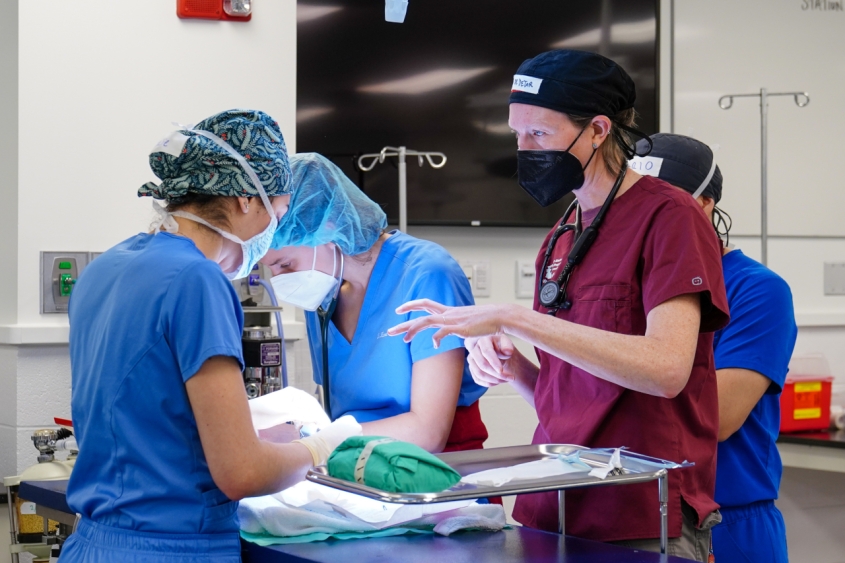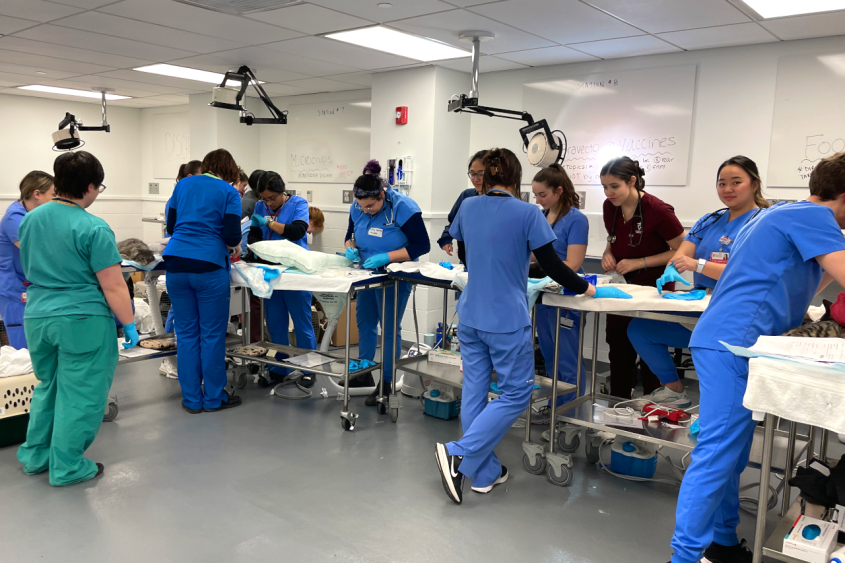VTMED 6425 - Introduction to Shelter Medicine
The 8 hours of lecture in this course covers basic shelter medicine principles, including the history of sheltering and humane organizations, issues with pet overpopulation and free roaming companion animals, an overview of preventive medicine and population health in shelters, sanitation and disinfection, and population management.
Prerequisites: VTMED 5400. Highly recommended prerequisite: VTMED 6734.
Enrollment limited to third-year veterinary students.
VTMED 6434 - Advanced Shelter Medicine
The course will cover more advanced topics in shelter medicine practice: management of common infectious diseases, facilities and housing, quality of life and humane euthanasia, behavioral programs, high quality high volume spay neuter, veterinary forensic exams, access to care and spectrum of care considerations, community cats, and regulatory matters affecting shelters and shelter practice. Lectures and readings are supplemented by in-person activities including an in-person shelter tour, outbreak management exercise, hands-on spay-neuter technique training, and intake procedure models.
Prerequisites: VTMED 6425.
Enrollment limited to third-year veterinary students.
VTMED 6734 - Companion Animal Welfare Issues
Despite significant improvement being made over the last 20 years, homelessness remains one of the largest welfare issues for dogs and cats in this country with an estimated 3-4 million dogs and cats entering US animal shelters annually. While puppies and kittens and healthy adult dogs and cats are still euthanized in some shelters, euthanasia rates have dropped remarkably in the last decade. However, many animals are still bred and sold in the US in less than ideal conditions. The large population of free-roaming and feral cats is both a cause and effect of feline overpopulation; approaches to cat control are controversial and emotionally charged. Animal cruelty, abuse and neglect, including animal fighting and hoarding, represent issues with which veterinarians are becoming increasingly engaged in their communities. The number of well-intentioned pet owners seeking exotic companion animals as pets is increasing. As our community expands globally, welfare issues from abroad are also becoming more apparent. Other controversial issues that impact companion animal welfare include: non-therapeutic/elective surgeries, access to veterinary care, and quality of life measures with advancing technologies in veterinary medicine. The goal of the course is to provide the tools needed for veterinary students to assess the welfare of the companion animals they treat; and to provide information that enables them to begin developing their positions on some of the common companion animal welfare issues, allowing them to assume leadership roles with regards to such issues in their future communities.
VTMED 6752 - Veterinary Forensic Medicine and Pathology
Veterinarians are uniquely qualified to recognize potential animal cruelty and are required to report suspected cruelty in the state of NY. The definition of cruelty varies from state to state, and prosecution willingness varies by county. Although forensic medicine and pathology rely on the same basic principles and methods used for conventional veterinary medical investigations, the analytical framework and purpose differ significantly, as do the risks and rewards. Through lectures from the pathology and shelter medicine faculty as well as ASPCA forensic department guests, this course provides students with the theoretical framework and practical information needed to participate in animal cruelty investigations for live and deceased animals.
Enrollment limited to third-year veterinary students. Permission of instructor required.
VTMED 6896 - Topics in Veterinary Medicine: Management of Animals in Disasters
This course introduces veterinary students to disaster response for companion animals and livestock in disasters on a local, regional, and national level. Core course activities include completion of official FEMA modules required for deployment in emergencies, including the Incident Command System and other systems employed by national, state, local, and NGO agencies. Additional materials include a Field Response modules from the ASPCA, and general resources on management of animal and human populations in disasters, including reading primary research on the subject. Independent study is supported by assignments and weekly class discussion with colleagues and guest experts.
Enrollment limited to veterinary students. All students will complete a total of 32 hours of asynchronous work consisting of recorded lectures, online materials, and related readings. These are accompanied by targeted engaged activities to support learning and clarify concepts. Some activities are small group or paired including a shelter design activity; this final activity is estimated to take 3 hours of preparation.
VTMED 6623 - Clinical Rotation in Shelter Medicine: Principles and Practice
This clinical rotation is embedded at the SPCA of Tompkins County with travel to other area shelters. During their time with MSMP, students will be exposed to the principles and practice of veterinary medicine in a functioning animal shelter setting. Students will provide direct veterinary medical care to individual shelter animals and apply population health principles, including infectious disease diagnosis, treatment, and management; shelter wellness and protocol-based medicine; high-quality, high-volume spay-neuter and dentistry; shelter animal behavioral assessment, pharmaceuticals and modification, low-stress animal handling, and population and capacity planning. Cases vary with season and shelter intake. The daily schedule includes topic-based online modules, in-person clinical work, and topic rounds. Students will also give a live CE presentation for shelter personnel. Although spay/neuter is part of shelter medicine and will be part of this rotation, this is NOT a spay/neuter intensive rotation; caseload depends on the needs of the shelters we serve. Weekend duty is optional and as-needed.
Prerequisites: VTMED 5520. Highly recommended prerequisite: VTMED 6425.
Enrollment limited to fourth-year veterinary students.
VTMED 6624 - Primary Care Surgery Service
The Primary Care Surgery service is a two-week rotation intended to provide students an opportunity to perform surgical procedures in the context of general practice. Emphasis is placed on physical exams (with a focus on low-stress handling) and addressing patients from a comprehensive perspective: intake to discharge. Student clinicians are accountable for all peri-operative care and communication with the shelter/rescue or client. Student clinicians are highly encouraged to experience different methods of performing key skills. There is a significant focus on ergonomic instrument handling, surgical technique, formulating appropriate treatment plans, accurate medical records, and pain/anxiety management. Spectrum of Care decision making is emphasized through case rounds, journal club, and student procedure presentations. Student surgeons work on critical decision making and collaboration with their team. By the end of the rotation, students will have had the opportunity to improve physical exam skills, surgical competence, confidence, and efficiency within the limits of accepted technique. Anesthesia support is provided by licensed veterinary technicians to ensure continuity in the methods of induction, patient monitoring, and recovery.
Prerequisites: VTMED 5520.
Enrollment limited to fourth-year veterinary students.






